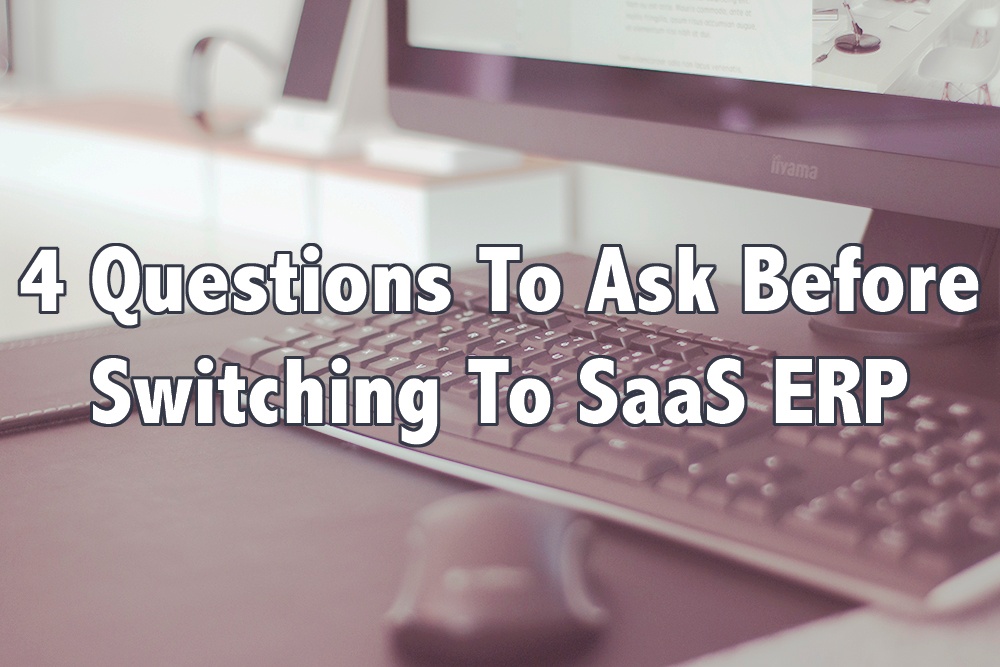
The recent rise of cloud-based enterprise software has been meteoric, as more and more businesses decide to host their ERP systems online. There are many benefits to using SaaS ERP, but in some cases it might not be the right fit for your company’s size, budget or unique processes. If you’re thinking about whether SaaS ERP is the right choice for your business, here are 4 questions that your company needs to ask itself before you sign on that dotted line.
-
How will the license and subscription work?
SaaS ERP contracts can often be simplified into the ‘per-seat’ subscription sales pitch, but it’s important that you really break down the proposed contract with your sales person. For example, whether each seat is defined as a generalized user versus a more specific ‘named’ user. If they must be named, does that mean that everyone who will be using the integration in any capacity needs their own seat? For companies that have some employees that will only spend a hour or two a week on the platform, this model won’t be financially viable. It might also be more advantageous if the seat can be used more generically i.e. some vendors may allow employees who are working in separate time zones to ‘share’ a user, cutting back on operational costs.
Additionally, its worth inquiring if your subscription operates on a monthly or annual basis. And if you ever do need to add users, will you have to wait for a new billing period to do so? Do you have data storage limits on your current contract that may restrict the amount of new seats you can add? Furthermore, if you’re only singing because the sales person offered you an array of discounts, you should assess how long those discounts will last. You may think you can afford that robust SaaS ERP because of introductory offers, but it’s critical your business ensures that the software is sustainable in the long term.
-
How will upgrades/maintenance work?
Many SaaS ERP platform vendors take on the responsibility for rolling out and implementing any necessary upgrades to the software—it’s one of the many benefits of using cloud-based software. However, your company should establish the protocol on how the upgrades work. Ask if upgrades will automatically be added to your system, or if they have to be approved by someone at the company before they roll out. Upgrades can sometimes mess with certain aspects or functionality in your ERP, so your business may prefer the option for approval first.
The same goes for any necessary maintenance of your SaaS ERP—who do you need to engage with when maintenance issues arise? Are any support hours included in your service fee, or will they be an extra charge? These questions are especially pertinent if you are working with a service or implementation partner—will the partner or the vendor be responsible for support? Make sure you have all your avenues mapped out before you commit to the subscription.
-
Is the SaaS ERP sustainable across borders?
This question is obviously less relevant to businesses who work out of one facility and don’t plan on expanding, but it is an important consideration for a growing business or one that already operates in different countries and time zones. Will the integration platform provide global service and support operations? Like the ‘per-seat’ stipulation we mentioned in the first question, you may be able to share your employees on individual users, or you may have to divide them up. Additionally, will the integration support multiple languages or currencies? If you are an international business, it’s key you ensure your SaaS ERP vendor has an understanding of how businesses need to operate differently depending on where they are located.
-
Will there be a smooth transition if we ever need to switch hosting locations?
It can be hard to predict the future of any manufacturing company, especially in today’s volatile market. Say your business needs to change your hosting site, or you would simply like to switch your data over to on-premise hosting. Will that be possible with the vendor you’re looking at? What will that transition process look like—and will you get the support you need to complete it?
It’s also worth looking at whether the SaaS ERP vendor offers a choice between single tenant or multi-tenant cloud architecture, or exclusively sells software on one platform. If you don’t ever see your business needing to switch to on-site software in the future, then it will be worth considering providers who operate exclusively in the cloud. However, if you think on-site storage of all or even part of your company data might be a part of your company’s future, make sure your SaaS ERP vendor will let you switch—and that they will help make that change as smooth as possible.
Got more questions?
While these five questions might be a good foundation for deciding on whether or not SaaS ERP is right for your business, there are likely many more you might have. If you’re still unsure on whether on not cloud-hosted enterprise software is right, get in touch with an expert at Datix today. We specialize in Epicor ERP consulting and implementation projects, both on site and in the cloud. We’ll be able to go through your business needs and processes and help you determine the best fit for a hosting option. Then, we can help you navigate every step along the path to implementation success!

